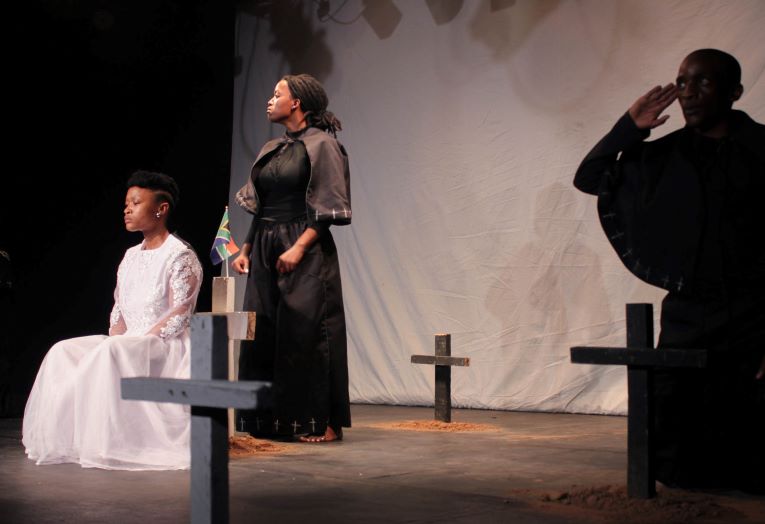Winnie speaks truth from the grave in stage play Nomzamo: The Stone that the Builders Rejected
Written and directed by young playwright Thabang Kwebu and featuring a talented young cast, this play deserves funding and therefore a full season on mainstream theatre stages.
By Edward Tsumele, CITYLIFE/ARTS Editor
As the doors opened,we hurriedly went in, our eyes glued onto the stage. We were met with a scene we least expected: the stageresembled a grim looking cemetery scene. On the left side of the stage, a picture of former President Nelson Mandela stood with his fist raised up in the usual power late posture. On the left side a striking picture of the late Winnie Madikizela-Mandela, the former wife of the first President of Democratic South Africa, stood with her iconic power salute. In the background there was a powerful sound of freedom songs, embracing our senses and carrying us on a nostalgic journey back to the struggle years. That is when such songs were sung by freedom fighters to motivate them to execute the struggle for freedom in South Africa.
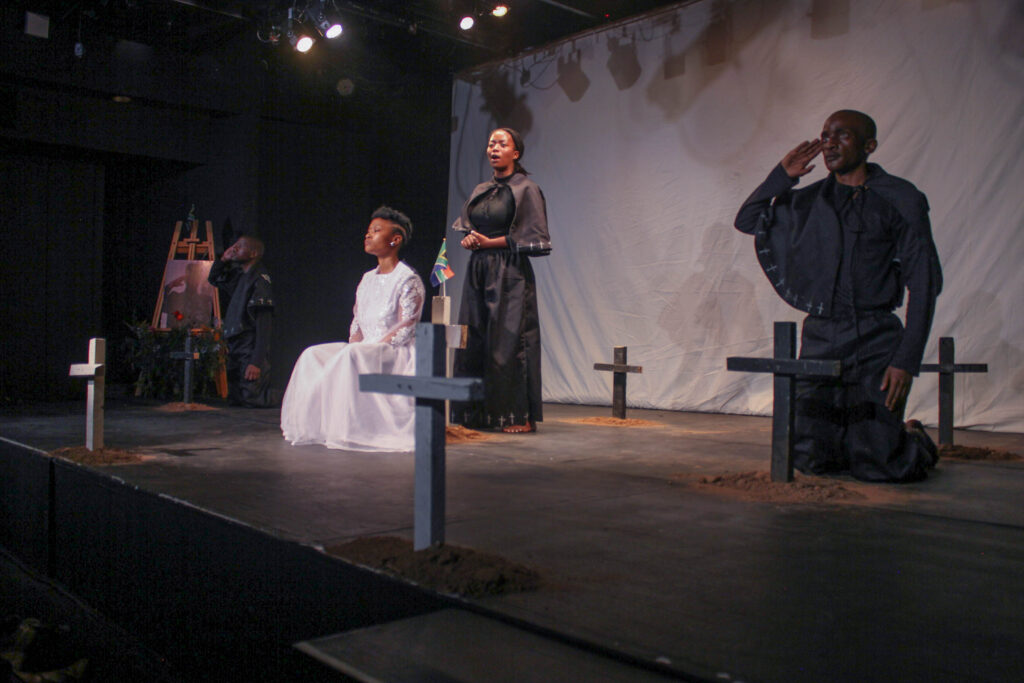
Behind a white piece of cloth, we could see moving bodies of people, who once we were all settled, emerged and burst in a powerful sequence of slow-motion dance, while singing freedom songs.
I attended the last performance of Nomzamo: The Stone that the Builders Rejected at the National School of the Arts in Braamfontein recently. The production unfortunately had four performances, a sad reality of lack of financial support from those that control the purse strings both in the private sector and the public sector. Well, I will come to that issue later. Anyway, this a theatrical production created in the same style as several others years gone by, that South African theatre audiences in the townships embraced for the longest of time, especially during the apartheid years. Then that style that came to be known as township theatre, before it morphed sadly into a lesser appreciated label called community theatre, deemed to be of a substandard quality,was used to fight the struggle for freedom. I am not here to debate the issue of whether the label of community theatre, which gained currency and even notoriety in post apartheid South Africa to describe shows created mainly in the townships is a misnomer or not. I leave that to those that are passionate about categorising and packaging theatre into distinct labels and hierarchies.
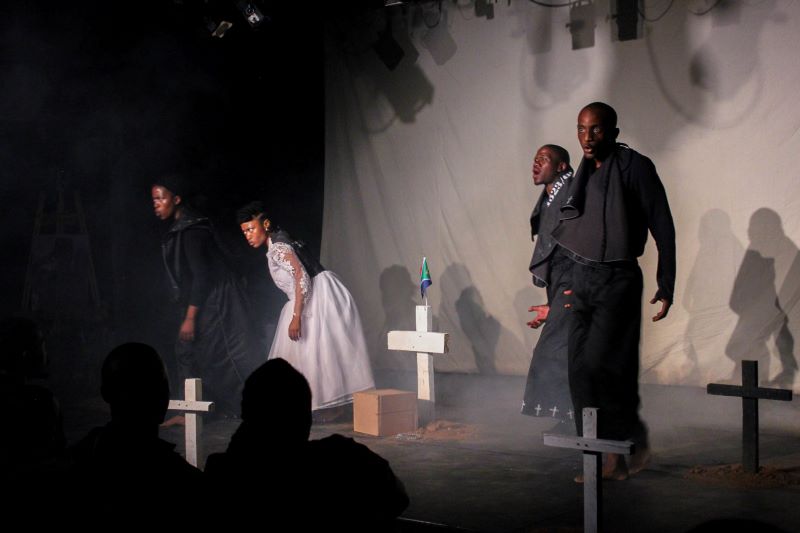
I am here to talk about how this production, whether you believe in its stand point or not, is a powerful portrayal of a powerful figure in society. A figure who put so much into the struggle and sacrificed a lot for the liberation of so many, and yet, she appeared to have received very little as a way of acknowledging her role in fighting for freedom. In the play, we get to hear that she was betrayed by society, a society who only embraced her after her death. Not even a public award that government dishes out to those it deems to have played a role in society, such as the annual Ikhamanga awards bestowed on such luminaries by the President in a situation complete with a prestigious ceremony where expensive drinks flow and spill among high powered guests and sumptuous meals are served. Yet this is a woman who sacrificed so much, including being tortured by apartheid policeand loosing herself, making mistakes in the process. She even lost her marriage when she and the man she had waited for 27 years while in jail, could no longer align their values and outlook once he was out of prison, ready to govern a democratic South Africa.
Here I know that society is divided between these two icons, and am not here to get into that messy debate about who was right and who was wrong. Rather here I am saying that whatever your position, you cannot fail to be taken by this play on a painful journey about how South Africa’s dream of a Rainbow Nation. This is as at best it continues to be a recurring dream, and at worst, a continuous nightmare that needs to be broken.
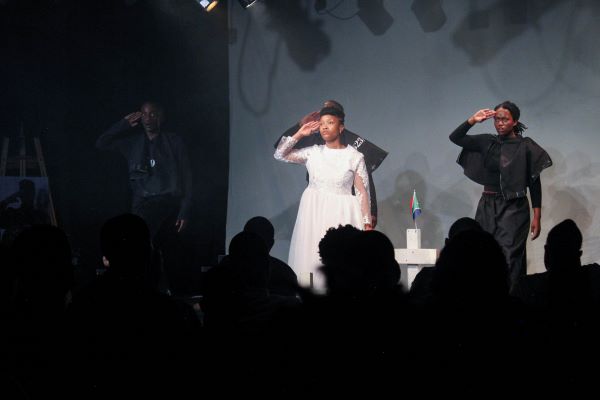
You cannot fail to notice the angry tone of this play about the state of current affairs in the country, and how so many continue to yearn for a day when social justice for the majority of mainly black people will arrive, wounds from apartheid healed and those still seething with anger from the memory of losing their loved ones through the monster called apartheid, find closure in order to move on.
This is a powerful play gives an insight into what remains to be done in this country to reach that stage when all will be equal, and the fruits of freedom filtering to those still on the margin of society, beyond the circles of the elite. Paradoxically today, that elite comprises both whites and a small group of politically connected black tenderpreneurs and the new educated black professional class that has since emerged in post apartheid South Africa. The majority still wallow in a sea of poverty, hopelessness and joblessness and the lack of opportunities. This play portrays that picture well, a picture that says it is not yet Uhuru. In fact, toward the end of the show, you get to get the message loud and clear through the iconic song of Letta Mbulu Not Yet Uhuru, which has proven to be prophetic.
I like the idea that the playwright, Thabang Kwebuhas adopted a style of looking at the life of Winnie speaking from The other World. This way, it allows her character to represent Winnie speaking the ‘truth’. Is it not so that they say when you are dead, that is when you speak the truth to the living simply because you have now crossed the bridge of fear and arrogance. This way, the character is believable when she speaks about what life has been for her while she was on our side of life. This technique works perfectly well in this instance.
Yes this play is controversial in the way that it looks at how Winnie was treated in contrast to her fellow freedom fighter and one time husband, Nelson Mandela. He is even portrayed as one person who betrayed her. For example, after divorcing her, an event that became a public spectacle, televised globally and gracing newspaper headlines as some kind of entertainment, he fired her from her government position as Deputy Minister of Sport, Arts and Technology. He went further in inflicting pain to his Ex-wife, the play argues, by not having her on his Will, and most painfully, not giving her the Qunu, Eastern Cape,family house as they were married in community of Property.
Well, there is nothing wrong in pointing these issues out, except that we are not told about her role in the breakdown of their trust, and eventually marriage. We are also not told anything about the bruising court case that settled the Qunu house in favour of the late President.
However, this is not to say that as a historical account, as a piece of art and even as a counter perspective on what seems to have been a one-sided narrative of how these two important figures fit in into the struggle history, is incorrect.
It also does not mean that the play does not deserve financial support from agencies such as the National Arts Council. In fact,if anything it does as Nomzamo: The Stone that the Builders Rejected, is a critical look at the life and times of the two figures that defined the struggle for freedom in this country in the 20th century. This is in fact one way of looking at the struggle and the roles of both figures in both their personal lives and their political lives through a feminist lens, here represented by the figure of Winnie.
In fact, this is a brave take on this rich political history by Thabang who plays the roles of both writer and director of this play, in which the acting talents of Simamkele Vusani, Malindi Mthethwa, Bongani Msibi and Sibusiso Khanyile, are something to talk about.
It is therefore important that this production is seen by as many people as possible so that at least people can come to understand where we are at as a country when it comes to the lingering issues of inequality, racism and structural issues that make it impossible for the fruits of freedom to be fully enjoyed by all.
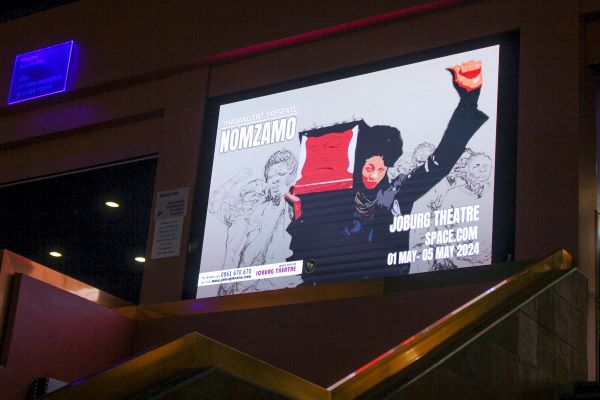
And yes, you may not agree with some perspectives when it comes to the personal lives of Winnie in relation to her E-x Husband, but this play is more than about the personal lives of the two figures. And yes, you may even find some of the scenes painful to engage in, but that is what good theatre does.
“What a painful and touching play. We really wish it would get more recognition and funding. The writer has brought justice to our grandmother’s name, and we will forever be grateful” the Mandela grandchildren who attended the show reflected after in a message they sent to the director.
I agree with them. Nomzamo: The Stone that the Builders Rejected indeed deserves funding to run for a full season at a mainstream theatre venue that is assessable to as many people as possible for this is important history captured in a scrip and translated into reality beautifully on stage.










